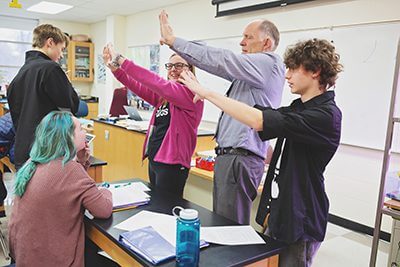December 13, 2018
 by Dr. Bill Hudson, Head of School
by Dr. Bill Hudson, Head of School
I have often heard that people like to read my weekly messages. That is always welcome news as it can be time consuming and sometimes stressful in the midst of my other duties and demands on my time. However, I truly enjoy the opportunity to reflect on a particular topic relevant to education or taking place in the world and connect it with what is happening at MPA. At times, I am struck by something that happens in a classroom or event that gives rise to a deep appreciation for our exceptional teachers and the unique educational experience provided at MPA.
It is particularly rewarding when something I write resonates with the community. My message two weeks ago, “Cultivating A Curious Mindset,” did just that. Since then, I have had a number of conversations with parents who connected what I wrote with their experiences in the workplace. In a moment of serendipity, Dr. Mike Mercer, Lower School parent of Henry and Charlie, shared that on the day I wrote about curiosity, he covered the same topic with his medical students. He shared with me a very powerful article entitled “Curiosity” written a number of years ago by Faith T. Fitzgerald, M.D. from the UC Davis Medical Center.
Dr. Fitzgerald included a quote from a colleague, Dr. Erich Loewy, who defined curiosity “as ‘primal wonderment’ that stimulates exploration, engages both imagination (conceiving the alternative explanations of new phenomena) and intelligence (mapping out the best was to determine which explanation is likeliest). Both imagination and intelligence are integral to humanities, science, and the synthesis of the two, which is medicine. Rather than stating that the study is humanities makes one more humane, I propose that humane people are curious and therefore choose to explore the humanities as well as the sciences.”
Please forgive me for the long quote but I struggled to find a way to say it better. We do not need to sacrifice the humanities for the sciences. A focus on the arts is not a detriment to the study of STEM (science, technology, engineering, and math). I remember a conversation I had with a parent several years ago. He was telling me about his work in computer programming and the success he has found in it. The more he explained to me what he did, the more I thought he was going to tell me that MPA needed more science, more math, more coding. Instead, he surprised me by saying that his family chose MPA because of the balance we maintain between the humanities and sciences. In fact, he thought that instead of balancing the two, MPA did an excellent job of interweaving the arts in the sciences and vice versa.
Further along in the article, Dr. Fitzgerald discovered a shared trait among Nobel Prize-wining scientists. “Curiosity without constraint, no preconceived image to emulate, no need for the façade of competence, opening inquiry into any area that stimulated their interests—these qualities seemed common to them all.” Many MPA teachers provided me with examples of how they spark curiosity in their classrooms and I would say the commonality among them all was very similar to what Dr. Fitzgerald observed. An inquiry-based approach that allows for the interests of students to be in the forefront, the stimulation of critical thinking, and the freedom, encouragement, and environment to explore ideas is the MPA way.
If you’ve heard me speak enough times, you will know that I firmly believe that a traditional approach to education that focuses solely on content knowledge alone will not prepare students for the world ahead. We need to expand the ways in which students approach a topic or problem and encourage curiosity. Traditional linear thinking may lead students along a predefined educational journey that is limited, less than expansive, and not rewarding. For instance, it is commonplace for those preparing for careers in the medical field to have undergraduate majors and/or minors in chemistry or biology. But that isn’t the only path forward. Case in point: Dr. Mercer’s undergraduate degree is in Latin.